by Jenny Rose | Aug 3, 2024 | Connection & Community, Emotional Intelligence
I received some second-hand feedback regarding my last post that’s had me thinking further about this idea of taking one’s own breath away.
We exist as individuals, and we also exist in relationship to others, and not only with our own species. In fact, as I reread the last statement, I realize it doesn’t quite reflect reality. We think of ourselves as discrete, separate individuals. “I.” “Me.” Yet it would be more accurate to say “we” and “us,” for we are each a world of microorganisms, internally and externally. Without all these bacteria, fungi, and other tiny organisms we couldn’t live. They facilitate everything from our digestion to our skin and mucous membrane health.

Photo by Helena Lopes on Unsplash
The point remains; however, we are each a part of ever-enlarging communities, from micro to macro. Oxford Online Dictionary defines ‘community’ as a group living in the same place or having specific characteristic(s) in common. A second definition is a “feeling of fellowship” with others because of common values, goals, and beliefs.
Community, in other words, is a fundamental human experience and shapes us in myriad ways. We are a social species; we need one another. I’ve been fighting with that reality all my life.
I believe much of our journey in life is about managing the continuum between narcissism (grandiose sense of self-importance, lack of empathy for others, need for excessive admiration, belief that one is deserving of special treatment) and echoism (a fear-driven compulsion to prioritize others’ needs).
That unwieldy balance necessarily takes place within the inescapable context of community.
It’s complicated.
We all know communities vary. Most of us acknowledge being part of several communities. Often our identities are inextricably bound with community membership, in the case of religion or family, for example. These bonds are very strong.
As I think about and participate in communities, I think about health. Am I healthy enough to function effectively and appropriately in my community? Is my community a healthy place for me?
Community is both a mirror and a crucible. Communities formed as social bubbles and echo chambers can be deeply comforting and validating. Everyone is like us. Everyone believes what we believe. We experience no discomfort or friction. We’re assured of our rightness, our clarity, our moral ground. We know the Truth. We never have to reconsider, find out we’re wrong, grow, learn new things, or change. We stand on solid ground and look into mirrors reflecting us exactly as we want to be seen.
Communities formed as crucibles, such as work, volunteer groups or neighborhood groups, are not so comfortable. In these communities we will experience conflict and friction. Everyone does not share our values and beliefs. Because everyone is not the same, we get glimpses of parts of ourselves we’d rather not see or have seen by others. We can’t hide our flaws and weaknesses, mistakes and missteps. We receive various kinds of feedback. We feel defensive, exposed, ashamed.

Photo by Cristian Newman on Unsplash
Crucibles are cradles for alchemy and change. They trigger our old traumas and shames without notice. They bring us face to face with ourselves and relentlessly demonstrate the effect of our behavior on others.
I observe that people who primarily interact in mirror communities are often black and white in their thinking. You’re for us or against us. You’re Us or you’re Them.
This kind of thinking strikes me as silly and unintelligent. The older I get, the more shades of grey I discover. Accepting shades of grey, however, is a lot more interpersonal and personal work than black or white labels. Shades of grey mean we have to think carefully about what we value and believe and why. We might have to defend our views. We might ask or be asked uncomfortable questions. Others might become annoyed, offended, or hurt by our position. People might try to make us small and silent, or fit us into a box so they can feel more comfortable with us.
We might let them.
I have often let them. And that’s about my own health. Healthy crucible communities empower rather than disempower; empowerment brings responsibility. A responsibility to be the healthiest and most whole person I can be. A responsibility to practice tolerance and respect towards myself and everyone around me. That means I’m responsible for my boundaries, my integrity, and my resilience.
The health of individuals in the community directly correlates to the health of the community itself; I don’t want to be the limiting factor in any community I’m a part of.
Striving for increased health and wholeness is a practice rather than a destination. Some days I feel like a shattered mess that can never be mended or healed. Other days I feel like a good-enough person, or maybe even a little better than that. I care about the people around me. My challenge is to care about myself equally, to hold my needs as important as those of others, to attend to my own well-being before becoming absorbed in caring for others. I don’t believe this makes me a narcissist, but it does move me away from echoism. People who view my behavior as narcissistic have perhaps benefited from those who, like me, have poured themselves out into others with no thought or responsibility for themselves.
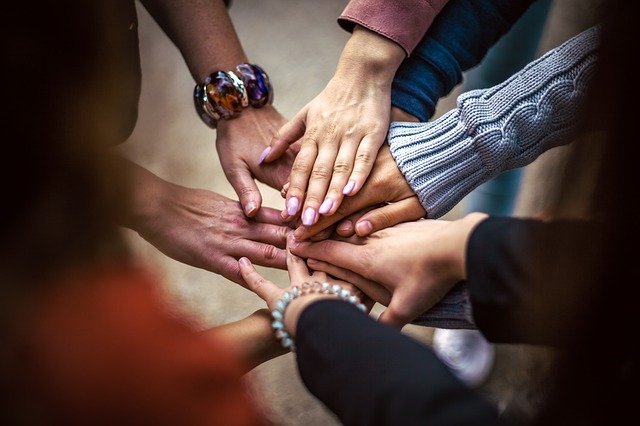
Image by Bob Dmyt from Pixabay
I am fortunate to have a true healthy community; the first I’ve ever participated in with any degree of authenticity and vulnerability. My greatest fears have been realized, more than once. I am seen a great deal more clearly than I wish to be. I am cared about, a very uncomfortable state of affairs. When I make mistakes or my judgment is poor, everyone sees, everyone knows, and it feels disastrous. I am frequently uncomfortable because some of my belief systems and lifestyle choices are different from those around me.
The same is true for everyone in my community. We see each other, and we make room for each other with affection, humor, and occasional irritation that only underlines our caring.
I’m not embedded in a mirror, but in a crucible, and I wouldn’t choose differently. As uncomfortable (terrifying) and messy and even humiliating as it sometimes is, my interaction in my community is making me a better person in every possible way; I see myself in a community context in ways I never would alone or in a mirror community. My community expands my humility, forces me to become more resilient, pushes my boundaries, and teaches me that what really matters is friendship and respect, not lifestyle choices and differing belief systems.
Every day I take things I’ve learned in my community and turn them over, sometimes cry over them, figure out how to grow and change and be more effective. I do it for me … and for them. I do it because it’s a challenge, it’s fascinating, it’s growthful, and I don’t want to be part of a mirror community. I like diversity, as uncomfortable as it can be. Diversity makes me bigger and wiser.
The phrase “the public eye” is so amorphous as to be useless. I’m not concerned with what the stranger on the street thinks of me, if indeed they spare a thought for me at all. But I do care what my community thinks of me, because I know I’m valued for myself, imperfect and weird as I am. I trust them enough to allow them to help me grow. I don’t feel pressured to be like any one of them; rather the pressure is to be the best version of myself possible, which is exactly what I want for them.
The best versions of myself take my own breath away now and then, the root of my last post.
Healthy community is absolutely essential for all of us, in my view. So is the ability to self-reflect and accept ourselves with love and grace. I want to respond to those around me with tolerance and respect, and I learn to do that best as I practice tolerance and respect with myself. As I see myself more clearly and kindly, I see others more clearly and kindly. As I foster my own growth and change, I can better foster the growth and change of those around me.
Healthy communities depend on healthy individuals, or at least communities committed to health need individuals committed to their own health. That’s what works. Neither echoism nor narcissism build health or growth of any kind for anyone.
Questions:
- Name three communities you feel a part of. Is each one more of a mirror or a crucible?
- Which of your communities feels most healthy? Least healthy?
- What do you find hardest about being in community?
Leave a comment below!
To read my fiction, serially published free every week, go here: 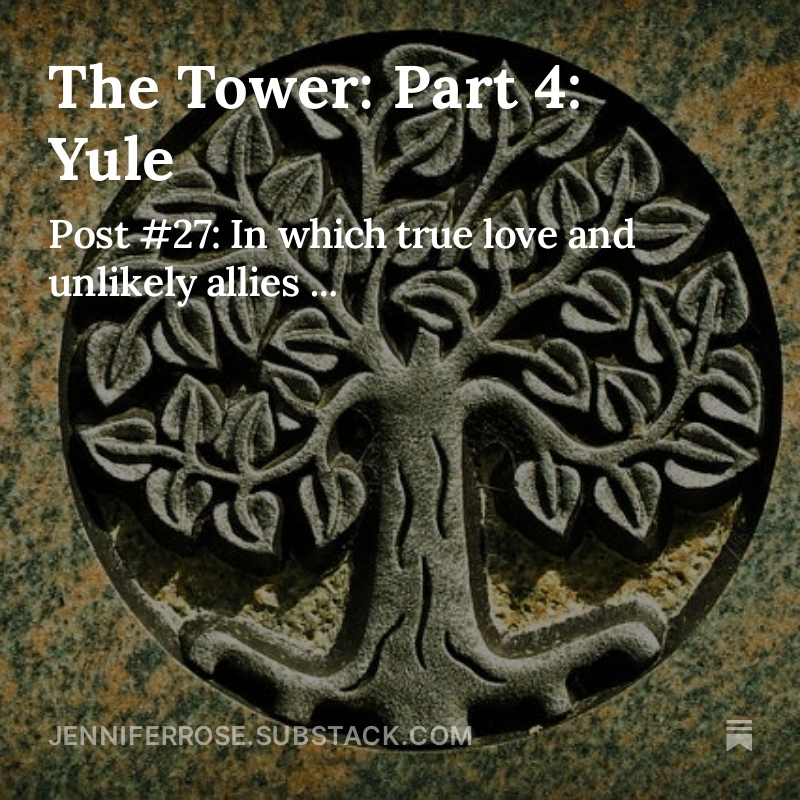
by Jenny Rose | Jun 22, 2024 | Emotional Intelligence, Needs
In a recent conversation, someone asserted to me that ultimately everyone does what they want. I felt an immediate fury. That does not describe my life at all. I chewed on my outrage and resentment for a few weeks, simmering, until I decided to get over it and figure out why I was so hijacked.
I was immediately lost in the puckerbrush. Making choices about what we do and don’t do is intimately tied to needs and wants, and I have yet to be able to distinguish between the two once beyond the level of survival needs, or find any kind of clarity from someone else. Needs and wants are unpleasant territory I don’t want to explore. (See? There it is. I don’t want to. Yet I am, and I might need to.)
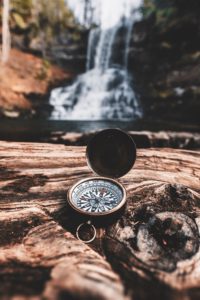
Photo by Bryan Minear on Unsplash
Then there’s the whole actions versus words aspect. People say they want things but don’t act accordingly. If we really want something, our behavior reflects it. If our behavior does not reflect our stated wants, we’re deceiving ourselves, or someone else, or both. I deeply distrust mixed messages. More unpleasant territory and old trauma.
Choice is in there, too. Choice is a big subject and a major theme in this blog. As I’ve mused on the statement ‘we all do what we want to do’ and made notes (you know I always make notes), I’ve wondered how we can compare a parent in some war-torn place attempting to keep their starving child alive another day with a wealthy person trying to decide if they want to fly their private plane to Paris for dinner or stay in and watch a movie in their in-home theater and have their chef prepare a seven-course meal. With wine, naturally.
One person has limited choices, all excruciating, to achieve continued survival for a few hours. The other has almost unlimited choices, all luxuries. How can I possibly compare the two? Can we say the parent trying to keep their child alive is doing what they want to do? Come on! Yet they do want to keep their child alive, right?
Perhaps it seems complicated and confusing because it’s complicated and confusing.
I wound up with a page full of notes, some sobering personal revelations, and a hairball.
On an internet search, I found articles pointing out the distinction between doing exactly what we want to do in any given moment (a toddler or a hedonist) and doing things we don’t want to do in service to an outcome we do want. That made sense to me.
If we focus on wanted outcomes rather than individual actions, we must have the ability to plan, look ahead, anticipate, and understand possible consequences of our actions. We also must attempt to predict the responses and reactions of the people around us to our actions, which means we have to understand something about emotional intelligence …

Photo by Manuel Sardo on Unsplash
… and now we’re back in the puckerbrush. I hate predictions. I don’t like leaps of faith. (I have a magnet on my fridge that says “Leap and the net will appear.” I don’t know why I keep it. It makes me mad every time I read it. Show me the warranty on that net. Show me the weight testing. Show me the damn net, in fact. Who will set it up when I leap? Are they paying attention or looking at their phone?) I trust my intuition, but I know I can be wrong. People are unpredictable. Life is unpredictable.
And yet we humans, including me, make choices all day long every day based on what we think will or might or could happen next. I’ve written about attachment to outcomes before. As I get older I’ve replaced a lot of my desired specific outcomes with simply wanting to know I did my best, regardless of outcomes. I may not like the outcome I get, but my integrity remains intact.
And then there are the people who don’t seem to understand actions and consequences in any kind of relationship. They choose what they choose in the moment and are hurt and/or outraged to discover the downstream consequences of that choice, especially in the context of many other choices. I observe this is a frequent divide along male/female lines. Women generally see everything as connected. Men generally see most things as discrete, in their own box. This is just one reason why I think “romantic” male/female relationships can be so devastating. We are often on different pages without knowing it.
If it’s true that we all do what we want in service to a desired outcome, what happens when my choices collide with yours? If you perceive me as blocking progress to your desired outcome you’re going to feel angry, and vice versa. We’re going to want each other to make different choices aligning with our personal desires. Most of the time, people won’t do that. We’re all attached to the outcomes we want.
A big piece of this for me is emotional labor, that hidden torrent winding through my life, sweeping away incalculable energy, time, and innocence. One of my priorities is healthy relationships. Close healthy relationships require time and attention; the ability to make choices for the good of the relationship rather than considering only our own wants and needs. This is an ongoing practice, not doing something we really don’t want to do once every six months and expecting applause. It means we have to face our own demons, learn to communicate clearly and honestly, negotiate, share power, and problem solve. It means boundaries and respect. It means reciprocity.
Having learned about reciprocity, I now prioritize my relationships to the degree the other does. I will not sign up to do all the emotional labor. I’m not interested in a close relationship like that. The price is too high. I’d rather put my energy into my relationship with myself. At least I appreciate my own efforts!
My conclusion about this ‘we all do what we want’ thing (gritted teeth – it still makes me mad), is it may be true if we consider our choices in the context of outcomes. I’ve made a lot of choices out of the clear knowledge that they were simply the right thing to do, too, choices that have been terrible for me, terrible in some of their consequences, yet ultimately still were the right thing for me to do. I had no outcome in mind. I don’t regret those kinds of choices, but they left permanent scars.

Photo by Cristian Newman on Unsplash
I want to blame others for all the time I’ve spent doing things I didn’t want to do, but it seems what we do and don’t do are entirely in our own hands, our own responsibility. Our lives are built on the choices we make, big and small, every hour of every day. If we don’t like our lives, we need to pay attention. Perhaps the useful question to ask ourselves if we hate what we’re doing at any given moment is, “Why am I doing this?” If we’re focused on a particular desired outcome, we may need to stop and think about whether our actions are effective in getting us there. Spending years of our lives desperately hoping and trying to reach an outcome and doing things we hate is not effective. I know this from personal experience. Our wants and needs change over time; what we once longed for may no longer be something we’re interested in. Sometimes we need to reality check ourselves. If we’ve been trying to get loved, for example, or please someone for a long period of time, it might be time to acknowledge our goal is not attainable or not worth attaining. Sometimes no matter how hard we work for an outcome it’s not achievable.
Then there’s the flip side: None of us do what we don’t want to do. That one is equally hard for me to swallow, but that’s a conversation for another day.
Questions:
- How much of each day do you spend doing things you don’t want to do? Why?
- What desired outcome(s) in your life requires you to do things you don’t want to do?
- Do you see your daily choices as isolated or part of a larger context attached to your wants and needs?
- Do you feel forced to labor emotionally? What would happen if you stopped?
- Who in your life reciprocates your level of emotional labor?
Leave a comment below!
To read my fiction, serially published free every week, go here: 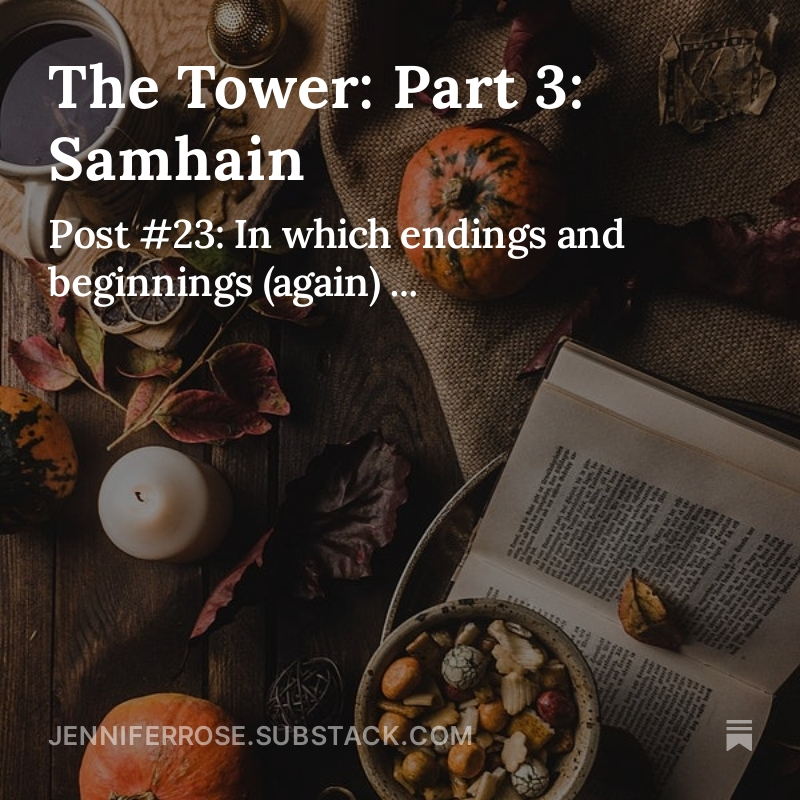
by Jenny Rose | Nov 4, 2023 | Emotional Intelligence, Feelings, Love
Elizabeth Gilbert is on Substack, and I follow her. Best known for her breakout novel, Eat, Pray, Love, she’s a journalist, speaker, and writer. Her Substack is called Letters From Love and more than ten thousand subscribe.
Letters From Love is the most uncomfortable Substack I read. I write that statement with wry humor. The premise is writing love letters to oneself.

Photo by Angelina Litvin on Unsplash
When I first came across it, I was equally horrified and attracted. I poked around, reading here and there, and realized quickly Elizabeth and I share certain experiences. I already knew this, because years ago I came across her brilliant piece on tribal shaming, which I immediately blogged about.
It takes one to know one.
When I found Gilbert on Substack I subscribed, so her newsletter comes regularly into my Inbox. Sometimes I ignore it for days, but sooner or later I open it and read. She posts love letters she’s written to herself. Publicly! She also has a podcast, does interviews, and posts love letters others have written to themselves.
(Cringe.)
I can’t help but notice my violent reactions. Me being me, I don’t choose to turn away and read something more comfortable. I have questions. What is my deal? I’ve been working for more than ten years on self-care and self-love, on reparenting myself and healing old trauma. Why am I not delighted with the idea of a practice of writing love letters to myself?
(Shudder.)
My first reaction is to crawl through the screen and beg her not to expose herself like this. Beg them all not to expose themselves. Don’t they understand how dangerous it is? Haven’t they learned a display of this kind of vulnerability will attract destroyers with stones and blades and (worst of all), terrible, terrible words of contempt? Oh, and don’t forget lethal indifference.
(If you’re not paying attention, I’ve now told you everything you need to know about the way I grew up.)
Except clearly the sky is not falling. More than ten thousand people are reading Gilbert’s love letters, and she goes on writing and publishing. The discussions within her community are neither indifferent nor contemptuous. On the contrary, they’re supportive and tender.
Which leads me to conclude my red alert reaction is about me rather than the practice of writing love letters to oneself.
Hm.
How can they do this? I wondered.
Could I do this?
No, no, no, not to publish! I reassured myself hastily. Just for me. Like my journal. My eyes only. A delete key. No one ever needs to know.
But there was a problem. Elizabeth writes to herself with endearments. Creative, funny, quirky endearments, like “my glinting little piece of foil from a gum wrapper.”
OK, now that’s fun! Words are so much fun!
What kind of endearments would I address myself with?
I’ve had pet names for my kids and my animals. No one else, really. Certainly not myself. My tone with myself has mostly been the harsh, hectoring, contemptuous, cold voice I internalized from the adults around me as a child.
More discomfort.
But, words … If I had a child just like the child I was, what endearments would make her giggle and feel loved and seen?
So I started a list of whimsical endearments. A very private list. So don’t ask! I was a little ashamed of myself, but no one else need ever know …
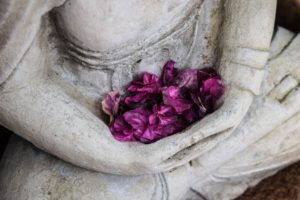
Photo by Chris Ensey on Unsplash
The list was fun, because it was a creative exercise. I can do creative exercise. It occurred to me part of my resistance to love letters (either giving or receiving) has to do with my disbelief in words. (Ironic.) Words can say anything. People say anything. The proof is in action. The older I get, the less interested I am in words, and the less I believe them. Demonstrate. Act. Show me, don’t tell me. As I’ve worked to heal I’ve developed routines for self-care, for eating well, for exercise, for sleep, for writing. I’ve been successful, and take much better care of myself than I ever have before. I take better care of myself than anyone ever has before, in fact.
But I haven’t written love letters to myself. I would have told you I could do so, if I wanted to. If I thought they’d have value. If I thought I’d believe them …
I grew up with emotional withholding. I’ve believed I’ve broken that pattern with my own children and my loved ones, including my animals. But now I wonder. Isn’t demonstration of love with no words a little sterile? I know the mixed message of loving words and abusive actions is devastating. Is active demonstration of love without words also confusing? Am I withholding from myself? Obligation, responsibility, duty – all these I’m very good at. But those are stony words. Where is the tenderness, the humor, the generosity? How about compassion? I feel those for others. I’ve spoken them from the heart; written love poems, love letters, notes, and cards – for others. Could I learn to feel and express them for myself?
Then I got sick with COVID, the events of the last couple of years (traumatic, protracted move; my mother’s decline and death) caught up with me, and I felt miserable. At once, I began putting pressure on myself to get back to writing, get back to work, get back to exercise, take out the trash, do the shopping, and generally pull myself together, because, after all, the world is full of bleeding, suffering people and I have a good life, a privileged life, and don’t deserve to feel sorry for myself and be lazy.
Not a love letter, in other words.
In the middle of the week during which I sat on the couch, alternately shivering and burning and blowing my nose, I wrote myself a love letter.
Well, maybe a let’s-see-if-I-can-tolerate-you letter.
It was an extremely strange experience. In fact, it made me cry, which didn’t help my congestion. Or my cough. At the time I had no sense of taste or smell, and I reflected that it was like that. When I tried to turn toward myself with love, tenderness, affection, whatever you want to call it, there was nothing. Just … nothing. A thick, numb shell between me and myself.
It made me so sad. Immediately upon the heels of that, I was ashamed. Because, you know, self-pity.
Almost as bad as self-love.
Wait now, what?
It’s bad to love yourself … if you don’t deserve it.
And, readers, I thought I’d left that belief far behind in the dust.
Then I began to feel angry, and I told myself I was going to start practicing writing love letters to myself. Because I deserved and deserve love as much as anyone else. I’m not important enough to be the most loathsome person in the world.
Questions:
- How does the idea of this practice make you feel? Can you write a love letter to yourself? With endearments and everything?
- If you could write a love letter to yourself, how would you feel about making it public?
- What do you most need to hear from someone who loves you? Would it have power if you wrote it to yourself?
Leave a comment below!
To read my fiction, serially published free every week, go here: 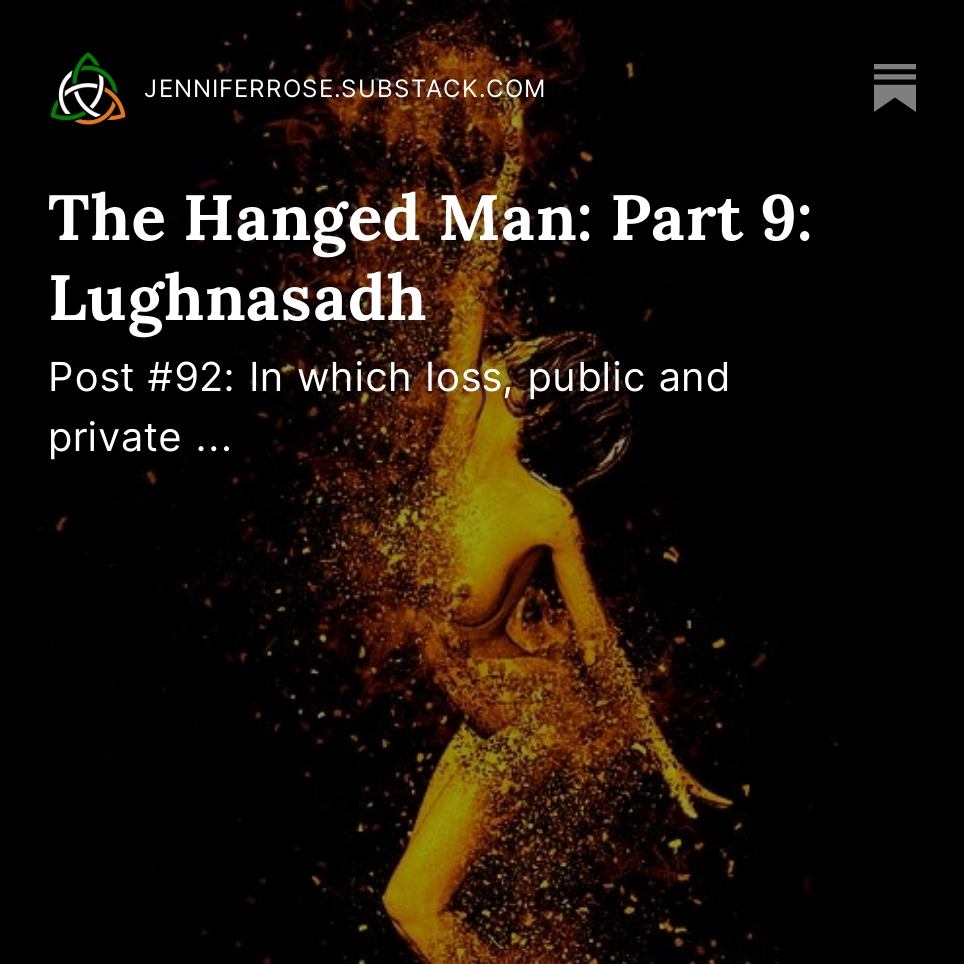
by Jenny Rose | Aug 26, 2023 | A Flourishing Woman, The Journey
Two weeks ago my 87-year-old demented mother fell in her memory care unit and broke a hip for the second time in less than a year. Eight days later she died in a hospital under the care of Hospice, my brother at her side.
Until I sat down to write this, I was afraid I had lost my words, lost the need to write them, lost the ability to form them into meaning. But I haven’t. I’m still a writer. This remains. That’s a relief.
Oh, I’ve been writing. Lists. Notes. An obituary. Texts. Updates to family and friends. Daily journaling. But it hasn’t been creative writing. It hasn’t been this blog, or my fiction. These last two weeks have passed by, the first in a blur of pity and anguish, and the second in numb relief glazed with exhaustion, and I have not posted or published. I haven’t kept track of the days; they spill into one another, as the days and nights blended together while my mother lay dying and we waited.
For a time words have simply been inadequate to relieve the pressure of my feelings in any organized or coherent way. They flew away from me, leaving a series of kaleidoscopic impressions, sensual details so vivid they frightened me with their power.
While my mother lay dying I reread my childhood copy of The Wind in the Willows by Kenneth Graham. Reading has also largely failed to sustain me during this time. I find myself unable to focus. I read a paragraph or two, and then realize I’ve been sitting staring into space, out the window or into the garden, not hearing, not seeing, not even thinking. Just sitting. But I needed a companion for the night watches, something comforting and familiar. Something innocent.

Photo by Josh Applegate on Unsplash
The fan in my window purred during those hours, blowing in cool night air and an occasional moth or mosquito. Every night, when I go to bed, I light a tea light in a candle lantern. When calls or texts reached me, I knew when I opened my eyes if it was before midnight or after, according to whether the candle still burned. Propped up on pillows, glasses on, my small bedside lamp alight, I spoke to Mom’s facility staff, emergency department doctors and nurses. I texted with my family. I read, the well-remembered illustrations making me smile as I communed with Rat, Mole, Badger, and the ridiculous Toad, finding respite for a few minutes before turning off the light and lying awake in the dark room, listening to the fan, feeling my heart beat, resting, breathing, waiting.
While my mother lay dying and after, I’ve stained wooden pallets. My partner and I are building a 3-bin compost system against the back yard fence. We set out sawhorses. I found an old brush, a rag, a stirring stick. We bought stain. I lay a pallet on the sawhorses, brush away dirt and debris, and paint every surface. The raw wood soaks in the oil-based stain, a rich brown color. The brush is more and more frazzled. I’m sloppier than I would be if painting a wall. The pallets are splintery. Some of the boards are split or loose. I bend over, the sun hot on the back of my neck and my bare arms. Mosquitos bite me. Stain drips between the boards as I brush their edges, dappling the sawhorses, falling onto the filthy old cream-colored jeans I’ve been wearing all summer in the garden, and onto my worn-out sneakers, used only for outdoor work now. As I maneuver between the boards, stain smears the skin of my hands and wrists. I kept the phone close, in a patch of shade.
This is the only sustained work I’ve been able to do. Now and then I wash a few dishes. I’ve done a couple loads of laundry. I go out into the garden, note the trimming, pruning, composting, mowing waiting to be done, and turn away. It all feels like too much. I don’t know where to start. It’s impossible to open the garden shed, get the tools, wheel out the wheelbarrow.
But the pallets. I can do that. It’s a simple task, direct. I don’t need to make any choices. Each side takes fifteen or twenty minutes. When I’ve finished a side, I wrap the brush in an old plastic bag, cover the can loosely, let the pallet dry an hour and a half in the sun. Then I turn it over and begin again. Two coats each side. One side after another.

Photo by Manuel Barroso Parejo on Unsplash
The smell of stain. The prickly feeling of intense sun on my skin. I think about compost, recycling, breaking down life to sustain new life. I think of ashes to ashes and dust to dust. I wonder if I’ll ever use the compost bins without thinking of Mom. I wonder who names the colors of stain and paint. I chose ‘Canyon Brown’ for this project. I vaguely hear birds, cars passing by. Small groups of women walk by in clumps, hospital employees on their lunch break, talking about families, gardens, school starting, hospital gossip. I should be at work, on that same campus, just a ten-minute walk away. I should be, but I’m not. I’m here, staining pallets, waiting for Mom to die and then on bereavement leave.
Am I bereaved? How would I know? I wonder why I don’t care enough to follow the thought. I let it drift away.
I decide I want to make bread. I don’t eat bread often, so rarely make it any more. But my rosemary is bushy and ready to be harvested, and someone brought fresh home-grown garlic into work to share before … before all this. So I make a sponge, stirring together milk, a little sugar, yeast, water. I chop fresh rosemary and garlic, very fine. I take flour out of the freezer and let it warm. The dough is heavy under my hands, sticky at first and gradually becoming supple and smooth. The earthy smells of garlic and rosemary vanquish the smell of stain in my nostrils. I turn the dough, kneading. The timer ticks off seconds and minutes. I clean the bowl, grease it, use a linen towel to cover it for rising. I put it in the oven for safe keeping, because the cats are likely to lie on it or step in it, or nibble at it if I leave it out. The bread, like the pallets, is a project in stages. I don’t have to focus on any one step for more than a few minutes. I move between the kitchen and the back yard with my phone, not thinking, not planning, just taking the next step, and the next. I can’t remember times, so I write them down. About 90 minutes for the stain to dry. An hour for the bread to rise. Another 90 minutes for the pallet to dry. Another hour for the shaped loaves to rise. Another 90 minutes. An hour for baking.
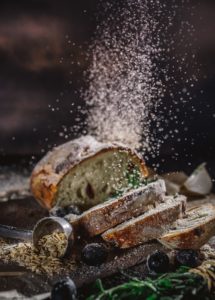
Photo by Helena Yankovska on Unsplash
At the end of the day, I have two enormous round loaves of bread to cool, slice, and put in the freezer. This batch will last me for a year. I have finished another pallet. I leave it on the sawhorses to dry overnight. My stained hands smell like garlic.
I haven’t cried since the last night call, my brother telling me Mom was gone. Perhaps I cried all my tears before she went. I receive condolences with all the grace I can muster. People talk to me about God and heaven. They talk to me about Mom. They talk to me about their own experiences of death. I try to be gracious. I try to look like I’m listening, like I’m there. With my brother and sons, my partner, I can be real. The faces of my friends comfort me. They don’t need anything from me. They don’t ask for anything. I can see their concern, their love for me, their sorrow. They hug me, and smile. They talk to me about small things, the daily things I’ve lost track of – family, friends, outings, work. I pick up a friend’s daughter and feel almost normal, doing an ordinary thing, a manageable task I cannot fail.
I realize part of my feeling of unreality is rooted in a loss of identity. I catch sight of myself in the bathroom mirror and pause. I rarely look at myself in the mirror. This woman, who is she? She isn’t the disappointing daughter any more. She can’t be, if there’s no mother to disappoint. What else is she? Who else is she? I look into my own eyes and feel no shame, no guilt. Did Mom take them with her? How will I navigate my life without them on my shoulders, without the knowledge that Mom is alone, suffering, needing? For fifty years I was at her side, day and night, year after year, ineffectual, helpless to fix or heal her physical pain, her dysfunction. Feeling my failure, my powerlessness, knowing I more often made it worse than better as time went on, even though she clung closer and closer to me as she aged. She could not release me and I almost waited too long to release myself.
But the geographical distance I put between us brought no real release. She still suffered. She declined, grew confused. Her body aged and began to run down. She was just as lonely without me as she was with me, just as emotionally remote, just as relentlessly needy. She cut herself off from me, but I still carried her. Internally, I still orbited around her. I still agonized for her.
I still loved her. I always loved her. I accepted she could not find me lovable, but it made no difference. She was my mother, and I loved her. All I ever wanted was for her to be well, and happy, but I could not make it so, and in her eyes it was my responsibility to fill her need. Indeed, she told me long ago her physical pain started with her pregnancy with me. I accepted the blame, and was heartbroken, and have tried desperately to make up for it ever since.

Photo by Nicole Mason on Unsplash
Now Death has come to stop her suffering. Has mine stopped, too? I don’t know. I’m too numb to tell. But I feel different. I feel … released. I prayed for her release and freedom, not mine, but perhaps they were linked. Many times a day I think of her, hear her voice in my head, and I realize with a painful clench of my heart she’s gone. It’s over. I can’t humiliate her anymore because of what I wear, how my hair looks, what I do, who I sleep with, or, most of all, what I write. She’s moved beyond humiliation. I can’t fail her anymore. And that’s a soaring, joyful, unbelievable thought. I can’t fail her anymore.
I wonder if I’ll finally feel good enough, if I’ll do a good enough job, live a good enough life. Might I simply enjoy my small talents, my joyful work, my community, my garden? Might I immerse myself in the loveliness of life without the gnawing guilt of knowing I’m happy when she’s not, I’m companioned when she’s not, I’m relaxed and rested and peaceful when she’s not, I’m laughing when she’s not?
The last couple of times I spoke to Mom, I told her it was okay to rest now, she could let go, be at peace. We told her her loved ones and animals were well and happy, and she could relax.
I told her, and I meant it. Was I telling myself, too?
She could not release me, yet I am released. Did Death break the chains when he gathered her in? Or now, at last, have I released myself, now that she’s moved entirely out of my power and knowledge?
As I write this, it’s Wednesday afternoon. I have finished another pallet. I have written. I have sat in the sun, read a paragraph or two at a time of an old Edna Ferber novel, rested my eyes on the garden. The lily stems are turning dry and brown, as are the leaves. Sunflowers bloom. The sun is hot. The phone has been sitting on my kitchen table all morning, silent, as I go in and out. I have balanced my checking account, scheduled a private swim lesson in a home pool, ironed a tablecloth and three napkins. Tomorrow I go back to work.
A new page of my life has turned. I can’t read it yet. It’s enough to sit with it in my lap, letting my gaze wander over blue sky and afternoon clouds, the garden, our old cars, the worn wooden boards of the porch, the bruise on my left knee, the mosquito bites on my right arm, the smears of stain on my hands. It’s too bright in the sun to read this new page, too hot, too much effort. I’ll read it later.
I dare to be at peace.
Daughter’s Dream (July 2014)
I dreamt I carried my mother.
The car had slipped out of her control
with a blind will of its own,
and I thought
I knew she shouldn’t be driving.
We landed in water.
I swam to her and held her in my arms.
Then the water was gone.
I carried my mother,
but she left my embrace,
slipping free of her embattled flesh.
Irrevocably, I felt her go.
I was alone.
I carried the vacant body of my mother.
Empty beds stood all around me
but the sheets were disordered and dank,
Smeared with shit.
I carried the vacant body of my mother.
There was no clean place to lay her down.
I carried the vacant body of my mother,
seeking to slip into my own freedom,
seeking absolution.
To read my fiction, serially published free every week, go here: 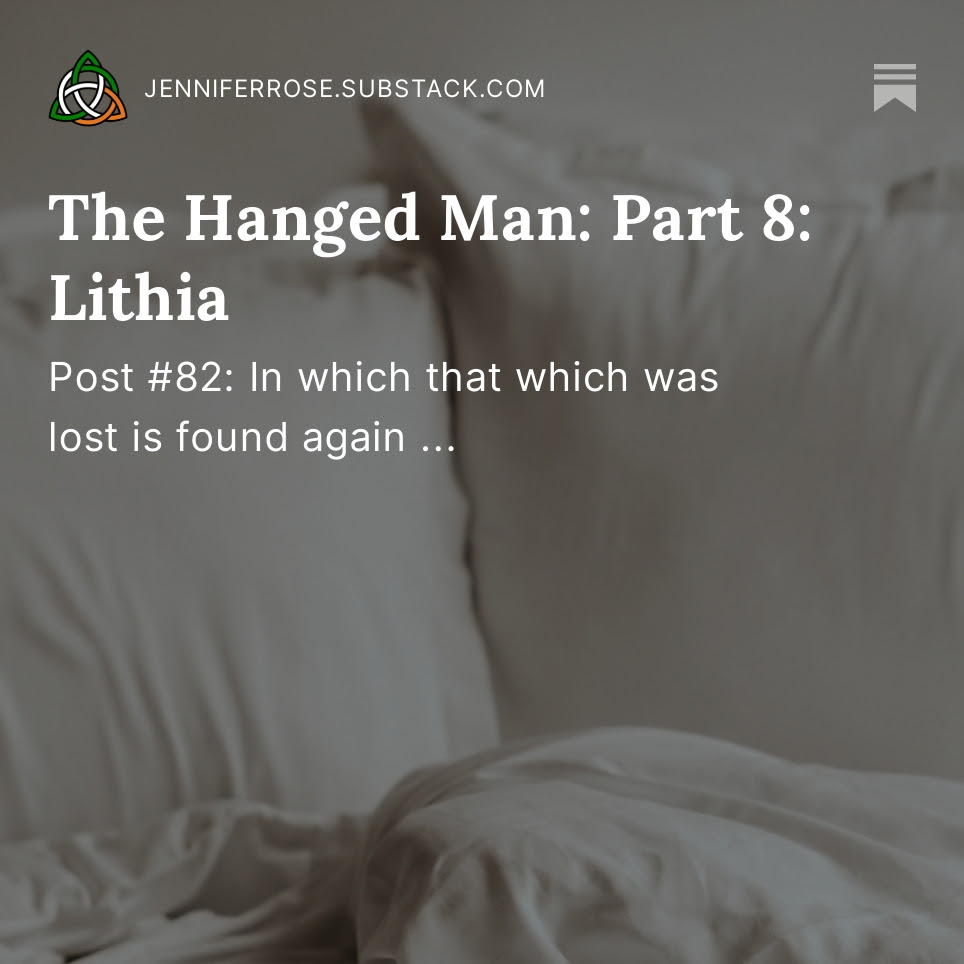
by Jenny Rose | Jul 8, 2023 | A Flourishing Woman, Spirit
We’re having a rainy summer here in Maine. I don’t mind. In fact, I feel grateful when I’m reminded how many billions of people are suffering extreme heat conditions and other severe weather around the planet.
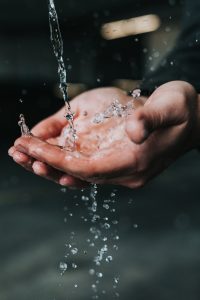
Photo by Nathan Dumlao on Unsplash
It does make it challenging to get outdoors, however. When a day off coincides with no rain, I disappear into the garden.
This was my first spring in our new house. Last spring and summer were necessarily about surviving the move. Outdoor work consisted of picking up trash and getting to know our little piece of the world.
This spring I went to work as the snow melted, raking, pulling weeds, thinking about where to put a compost system, laying out new beds. A morning here, an afternoon there, a snatched few hours in between work and life’s other demands.
I notice when I do put everything aside to play in the garden I’m filled with toxic shame at the end of the day. Certainly, I dug and weeded, knelt and stooped, barrowed and raked, pruned and planted and trimmed until I was sore and exhausted as well as renewed by my time under the sky on the earth’s body. In proportion to my joy I feel self-hatred. I did not work in the house. I did not pay bills. I did not do laundry. The sink is full of dirty dishes. The cats didn’t get my attention. I didn’t work on my blog or fiction. Instead, I ground dirt into my hands and nails, into the knees of my old jeans. My filthy clothes stink of bug spray. I’m sweaty, sunburned, and thirsty. I’m happy.
And there’s the rub.
Happiness is Not Allowed. If it makes me happy, I shouldn’t be doing it. If it makes me happy, I shouldn’t get paid for it. The only truly productive way to live is to do what is not joyful. Happiness is selfish and lazy.
The first commandment of life is Make Yourself Useful. Happiness doesn’t come into it.

Photo by Cristian Newman on Unsplash
This internal voice has always been with me. I’m sure I wasn’t born with it, but when my memory starts the voice was already deeply rooted in my mind. The only things worth doing in life were repetitive, obligatory, dutiful activities. Responsibilities. Bonus points if the tasks were in service to someone else. An activity done for personal pleasure was a threat, a disobedience, a terrible betrayal.
Other people in my world were not happy; therefore, I had no right to be. Ever.
I recognize the lies, the rebellion and resentment, and the sinking heart accompanying this twisted belief. I know where the belief comes from. But still, still it triggers painful, cringing shame.
Yet I continue to snatch what hours I can to be in the garden. As I work, I think about my shame, the sadness of people who cannot allow themselves or anyone around them to be happy, and all the ways this particular belief has limited and inhibited me. So many of my passions are muted and hidden in the privacy of my own heart: Dance, writing, gardening, swimming. Oh, people know they’re activities I enjoy, but I hide my absolute, blazing passion for them behind a casual demeanor. Because I’m ashamed.
We have a corner lot, so a comparatively large garden space. I frequently clear patches of earth that lie bare under the sky, soaking in rain, sunshine, and receiving whatever seeds come. Sometimes it’s weeks before I get back to that same little patch, and I’m always delighted and surprised by how quickly new things come to grow wherever I’ve made a clearing. Some would call it all weeds. I call it life.
I’ve been thinking about the hard, muddy work of clearing, walking away, and then the miraculous return of life while we’re looking in another direction. I came across an article recently entitled “We are Defined by the Things We Don’t Do.” I’ve been thinking about that, too. Am I defined more by my choice to garden during a sunny afternoon or the fact that I didn’t clean the kitchen?

Photo by Stephen Leonardi on Unsplash
My hours in the garden, in the pool, dancing, writing, clear the ground of my being. Into that cleared ground come words, inspiration, delight, peace, rest, freedom. Without those hours to nurture and refresh me, my soil would grow hard and compacted, unreceptive and sterile. I cannot sustain myself with an endless round of housework and taking care of business. It’s not enough. No amount of efficient, effective housework gives me the joy I feel in the garden, or in typing words onto the page.
In short, my understanding of what it means to be “productive” does not make me happy or healthy.
So, what does it say about me as a person that my joy comes from such “selfish” and “lazy” activities? What kind of a terrible person chooses to grub in the garden rather than do the dishes and emotionally labor for others? What kind of a terrible person accepts payment for doing her heart’s delight?
A person like me, readers. A person like me.
I read a lot about mindfulness. I practice it in many different ways. It occurs to me, however, that my best moments and hours are spent mindlessly. The rhythm of swimming. The wordless seduction of music liberating me into dance. The sweat and texture and smell of working in the garden, the feel of the tools in my hands, the itch of a mosquito bite, the sear of sunlight on the tender skin at the nape of my neck. I’m not thinking. I’m not planning. I’m not trying or worrying. I just am. I have truly disappeared into the garden. And in that cleared ground of being the rest of my life, the necessary, the daily, the trivial things like wiping the counters and making the bed, are deeply rooted.
It’s in mindlessness that I find mindfulness. Mindlessness is a cleared patch of earth, dark, moist, rumpled, with seeds and roots and microbes and insects hidden below and the sky above. What will come to grow and live in that space? What will I weed out, and what will I nurture? What gifts, what treasures will come into the ground I have cleared?
The answers to those questions are none of my business now. The ground is cleared. Now I walk away, look in another direction, clear a patch on another side of the house, under the magnolia, maybe, or alongside the old well. Rain will come, and sun. Birds will come, insects. Roots and seeds. I will go inside, scrub the first layer of dirt out from under my nails, off my skin and cuticles. I’ll strip down and wipe insect repellent and sweat from my skin, treat bug bites. I’ll rehydrate, change into clean clothes. I’ll feel the tension between my pleasure in my outside work and the shame and reproach of the undone inside work.
And somewhere, when the time is right in some future moment, I’ll go back to the memory of that patch of earth, still chilly from winter when I cleared it, now thick with new life that crept in when I wasn’t looking, and I’ll find meaning and mindfulness. I’ll find creative inspiration. I’ll find words and peace and clarity.
I’ll find joy.
Questions:
- Where do you do your most joyful work?
- How successful do you feel at balancing the necessities of your life with private pleasure right now, today?
- Do you have an active, nasty, mean-minded internal critic? How do you shut that voice up? Do you recognize the voice as belonging to some person in your life?
Leave a comment below!
To read my fiction, serially published free every week, go here: 

















